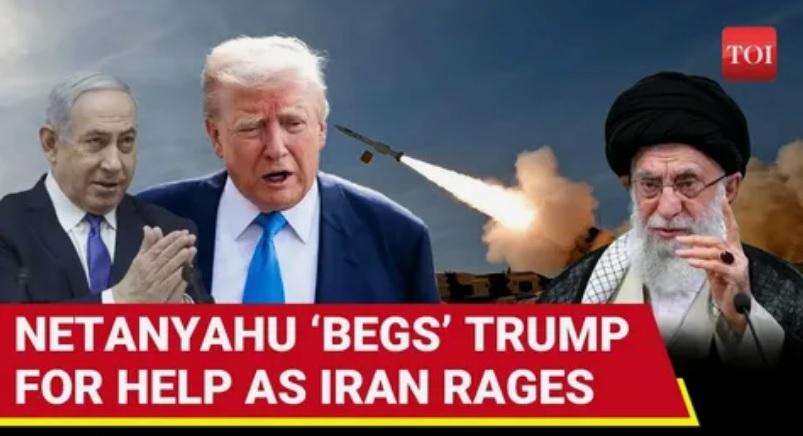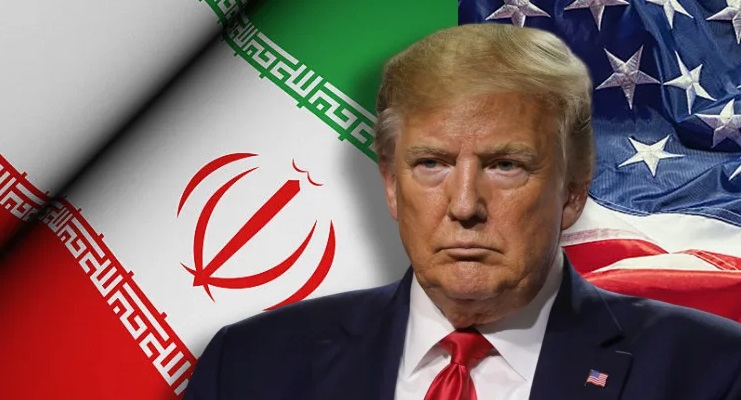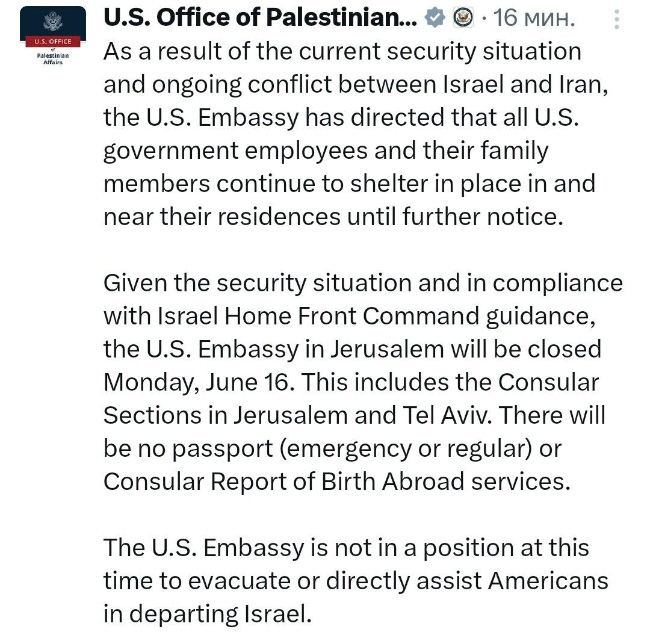
Israel has asked the Trump administration over the past 48 hours to join the war with Iran in order to eliminate its nuclear program, according to two Israeli officials, AXIOS writes.
The big picture: Israel lacks the bunker buster bombs and large bomber aircraft needed to destroy Iran's Fordow uranium enrichment site, which is built into a mountain and deep underground. The U.S. has both within flying distance of Iran.
But the Trump administration has so far distanced itself from Israel's operation, and argued that it would be illegitimate for Iran to retaliate by striking U.S. targets.
Directly attacking Iran, even if the U.S. involvement is limited to bombing a single site, would pull the U.S. directly into the war.
However, if Fordow remains operational after the operation ends, Israel will have failed in its goal to "eliminate" Iran's nuclear program.
Behind the scenes: An Israeli official claimed to Axios that the U.S. might join the operation, and that President Trump even suggested he'd do so if necessary in a recent conversation with Prime Minister Benjamin Netanyahu.
A White House official denied that on Friday. A second U.S. official confirmed on Saturday that Israel has urged the Trump administration to join the war, but said currently the administration is not considering it.
A senior White House official told Axios Saturday that "whatever happens today cannot be prevented," referring to Israel's attacks.
"But we have the ability to negotiate a successful peaceful resolution to this conflict if Iran is willing. The fastest way for Iran to accomplish peace is to give up its nuclear weapons program," the senior official added.
What they're saying: "The entire operation... really has to be completed with the elimination of Fordow," Israeli Ambassador to the U.S. Yechiel Leiter told Fox News on Friday.
Israeli officials have raised the idea of U.S. participation to take out Fordow with U.S. counterparts since Israel's operation began.
An Israeli source said the U.S. is considering the request and stressed Israel hopes Trump agrees.

President Donald Trump is desperate not to fight a war with Iran. But can he really avoid it? – asks CNN.
Compelling national security arguments and domestic political considerations mean it makes sense to stop short of direct US offensive operations in the long-dreaded conflict that Israel describes as a matter of preserving its own existence.
But powerful forces could suck America deeper into the conflict than its current role in helping to shield Israel from Iran’s deadly rain of missiles and drones.
CNN reported that over the weekend, Trump rejected an Israeli plan to kill Iran’s Supreme Leader Ayatollah Ali Khamenei, according to two sources.
But some of this is out of Trump’s hands.
Should Iran decide it has nothing to lose and attack US bases and personnel in the region, or US targets across the globe, Washington will be forced to respond hard to preserve credibility and deterrence. Another possibility is that Tehran could create duress on Trump to rein in Israel by attacking international shipping in the Gulf or Red Sea and bring on a global energy crisis.
Pressure is also mounting on Trump from inside his own party for action that only the United States could carry out — a mission to destroy Iran’s subterranean site at Fordow, which is believed to be beyond Israel’s airborne capabilities. The logic of such a strike would be that Iran is now uniquely vulnerable, and a better chance may never come for the US to destroy the possibility of an Iranian nuclear weapon.
CNN’s White House team has reported that the president is deeply skeptical about throwing the United States into the fray. Such a move would be fraught with danger. It could lead to the expansion of the conflict beyond its current belligerents and lead to a grueling open-ended war with no clear endgame.
If there is one lesson from the early 21st century, it’s that war objectives and analyses of the Middle East drawn up in Washington almost always turn out disastrously wrong. The idea that Iran’s brutal clerical regime could fall might be attractive. But the toppling of Saddam Hussein and the civil war in Syria show that Middle East nations can simply splinter when power vacuums open.
A US intervention would also widen deep strains in Trump’s political base and dismantle a core principle of his “America first” movement: that the United States should stay out of foreign quagmires after more than a decade of pain in Iraq and Afghanistan. It is only a few weeks, after all, since the president set out a new vision for the Middle East and American involvement.
“The so-called nation-builders wrecked far more nations than they built — and the interventionists were intervening in complex societies that they did not even understand themselves,” Trump said in a major speech in Saudi Arabia in May. “A new generation of leaders is transcending the ancient conflicts and tired divisions of the past and forging a future where the Middle East is defined by commerce, not chaos; where it exports technology, not terrorism; and where people of different nations, religions and creeds are building cities together — not bombing each other out of existence.”
A new American war is utterly incompatible with such a vision.
Trump started his second term vowing to be a peacemaker.
But five months in, two major wars raging when he took office are worse and the dangerous new conflict with Iran promises the greatest test of “America first” restraint.
Events have overtaken Trump’s “American first” reticence to get involved abroad and exposed the shallowness of his statesmanship. Worsening crises may offer a preview of a world that becomes more volatile in the absence of steady and constant American leadership.
Trump’s increasingly brittle domestic political grounding and his already questionable authority internationally will only complicate his dilemmas. In many ways the Iran conflict is the kind of international crisis with no easy answers that he avoided in his first term.
Now it could define his second.

Israel’s sudden attack on Iran has threatened to disrupt oil supplies in the Middle East, placing the OPEC+ cartel’s recent decision to increase crude production into the spotlight, ‘Financial Times’ writes.
The big jump in crude prices on Friday after Israel’s attack on Iran will narrow Trump’s options in dealing with other looming geopolitical issues and raises concerns that it could spur US inflation, say analysts.
“The OPEC+ supply additions created space for some of the supply disruption that could come from the Israeli attack on Iran. And it is also true they could have created space for new Russia sanctions. But they don’t create space for both,” said Kevin Book, head of ClearView Energy Partners in Washington.
He said Trump could turn to the US Strategic Petroleum Reserve, the world’s largest emergency stockpile, if the oil price surge is prolonged or Middle East supplies risk being disrupted.
The SPR has around 400mn barrels, well below its 727mn barrel capacity, following drawdowns by former President Joe Biden to limit price increases after Russia’s full-scale invasion of Ukraine.
Trump could also ask the Saudis to pump even more oil, although this would raise difficult questions for Riyadh. Iran is one of the original members of OPEC and the kingdom will be wary of disrupting a détente between Iran and its Arab neighbours in the Gulf, analysts said.
“What do presidents do when oil prices go up? Well the first thing is they pick up the phone and ring Saudi Arabia. But Riyadh and other OPEC+ members would likely respond cautiously,” said Rapidan’s McNally.

read more in our Telegram-channel https://t.me/The_International_Affairs

 11:31 17.06.2025 •
11:31 17.06.2025 •






















